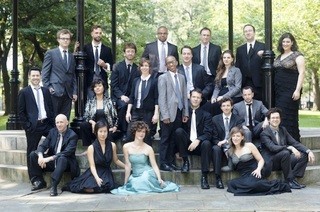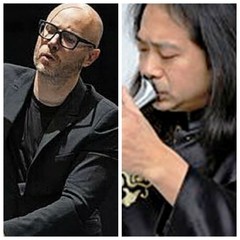|
Back
Seeing the Forest Through the Tweets New York
Merkin Concert Hall
08/14/2017 -
“How Forests Think”:
Pauline Oliveros: Earth Ears: A Sonic Ritual
Anna Thorvaldsdóttir: Aequilibria (U.S. Premiere)
Liza Lim: How Forests Think (U.S. Premiere)
Wu Wei (Sheng)
International Contemporary Ensemble, Baldur Brönnimann (Conductor)

International Contemporary Ensemble (© Carrie Schneider)
“What the flowers in the meadow tell me”
From Gustav Mahler’s Third Symphony, original second movement title
What Mahler heard from his local flora was 123 years and a thousand cosmos away from what was heard by the three composers last night. Mahler might have recognized a few bars from each of the works (disguised bird-calls, a few breathy flutters), and his ever-acute curiosity would have been aroused. But this edition of Mostly Mozart, called “How Forests Think”, was hardly the nature-aesthetics of the Austrian nature-lover.
Then again, one was curious–though hardly upset–that the music was part of “Mostly Mozart”. Alfred Einstein once oddly stated that Mozart had no interest in nature. But “Mostly Mozart” encompasses Schubert, Schubert had an adoration of Nature, And “How Forests Think” was appropriate enough for Mostly Mozart.
Still, had the International Contemporary Ensemble (ICE) titled the concert “Grandma’s Pasta Recipes” or “My Pet Hippopotamus”, a voyage over the cosmos to hear them would be highly recommended. Whether the totally aleatory Earth Ears or the cryptic cries and whispers of the other two works, this is an ensemble which never ever loses its electric–and electrifying–accuracy and volition. Further, even with the most arcane settings (and nothing was easy in last night’s performance), ICE has a physical humanness and personality.
One might unfairly single out percussionist Ross Kare sawing a violin box or pouring sand or executing the most subtle kettledrum dynamics; or English horn player Christa Robinson in the lyrical finale to Liza Lin’s How Forests Think. But not a single member of ICE was anything but en point throughout the entire concert.
And how difficult this must have been. The opening Earth Ears: A Sonic Ritual by the late Pauline Oliveros was a work without score (simply three pages of instructions, which I surveyed on YouTube), without conductor, and without written notes. In fact, as the instructions show, the piece could go on for hours, if they’d wanted, with a series of cycles.
Program annotator Steve Smith commands us that “Attentive Listening Is Mandatory.” And obedience to Mr. Smith leads to a curve of sounds. From the beginning individual tweets, breaths, and single eighth notes on the accordion (the composer’s instrument of favor) through a thicket of repetitions, and alterations, one could, with enough imagination, envision foresty-y sounds. Badger scratching, beaver-building, cougar grrring. Even more, though, while naught is written down, these 15 splendid musicians gave it a form, a sphere of sorts. The puzzlements of the beginning coalesce, send off an interplay of music...and then fade like the earth itself at dusk.
Since I am traveling to Iceland in a few weeks, I was personally interested in Anna Thorvaldsdóttir’s Aequilibria, titled after the archaic spelling. And now knowing how this volcanic geothermal-driven country shifts geologically from aeon to aeon, decade to decade, it was evident that balance was essential for life itself.
That equilibria here was established with one instrument sustaining a note with others extending out in webs and minute lines. As the work went on, it became far more complex, doubtless in an algorithmic method which I could hardly deceive, with the sustaining notes doubling or with two-note harmonies.
Though a great admirer of Ms. Thorvaldsdóttir, most of the piece left me rather cold. The notes obviously meant something on paper or in studies, but they seemed meandering, inconclusive. With two exceptions. Towards the end of the 13 minutes, the ensemble came together in a lovely graceful loud series of chords. And a minute after that, the strings produced a few harmonic measures which actually were romantic, luscious, as if the earth had chosen to stop its cosmic weaving and wandering, as though Prophet Joshua had commanded, “Earth, Stand Thou Still.”
Those two moments were startling yet, like a lone birch tree in the Iceland wastes, exquisite in themselves.

B. Brönnimann/W.Wei (© Courtesy of the Artists)
Australian composer Liza Lim was present for How Forests Think, a four-movement work inspired by Eduardo Kohn’s eponymous book. As she describes it, “Stories, dreams, thoughts, inhabit multiple forms in a living matrix; they ask us to look beyond our limited human gaze and limited human time-span.”
The concept is priceless, and I so wanted to remember it without having to go through the music. But Ms. Lim gave the usual flutters and twirps an extra sound with Wu Wei, the world’s finest virtuoso-composer on the Chinese sheng.
Admittedly, my years in Hong Kong were not made easier by hearing the most uncomfortable sounds from this extended sophisticated panpipe. With its multitude of pipes, with mouth-organ style inhale/exhale chords, it still resembles a wheezy accordion. And while this makes theatrical sense in Chinese opera, the sheng is neither Strad nor Steinway.
Wu Wei, though, is a decided virtuoso (John Cage and Tan Dun are among a horde of composers who have written for him), and while I could not revere either his sounds or the ICE group which imitated and emulated the sheng, the last two movements of How Forests Think were delightful.
“Pollen”, the third movement, was light on its feet, with bird-calls and sound effects and so complex that...er...uh...it was nothing to sneeze at.
The finale, “Trees” was perfect. It was Béla Bartók night-music, a single long melody on English horn, with other instruments chirping in. Conductor left the podium at the start, ambled to the back, and the lights dimmed over the stage before the last notes.
And while the audience cheered the composer and ICE itself, I left Merkin Concert Hall early, strolled over to Central Park, and (to paraphrase Walt Whitman) “looked up in perfect silence at the trees.”
Harry Rolnick
|